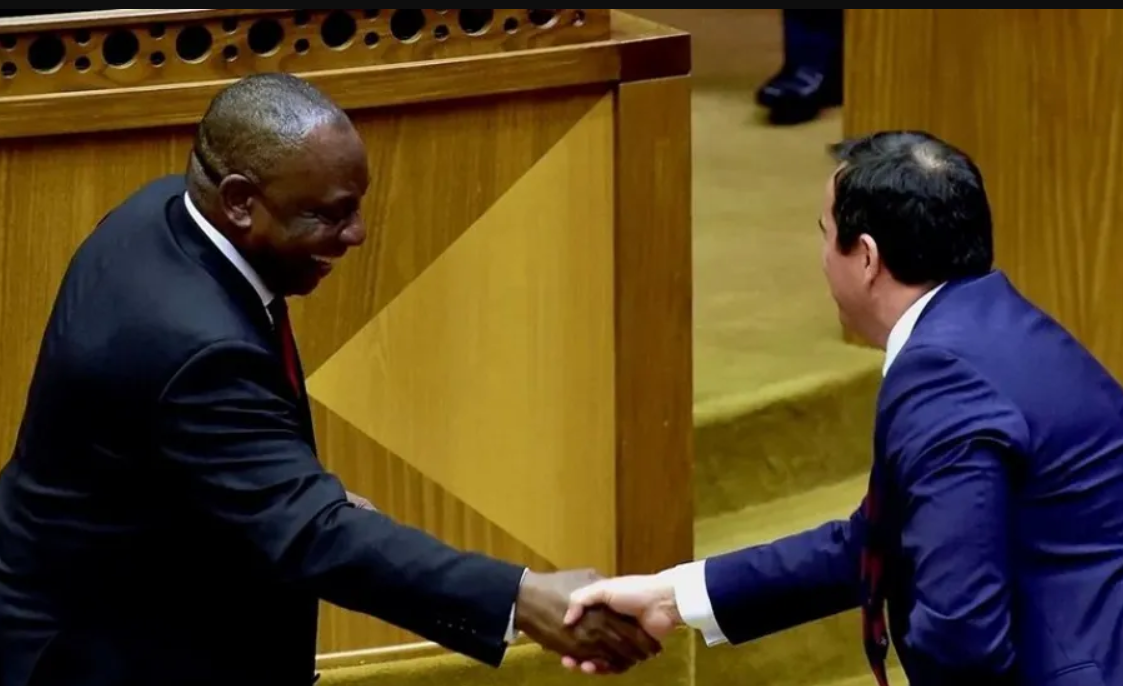Historic Coalition Government Brings New Era to South Africa
After the African National Congress (ANC) party lost its parliamentary majority in the May 2024 elections, President Cyril Ramaphosa announced the establishment of a breakthrough coalition government, marking a historic era for South African democracy. This historic action unites different political factions to tackle urgent national issues, signaling a dramatic change in the country’s political climate.
Revised Cabinet Organization
The African National Congress (ANC) will keep 20 ministries, including military, finance, and foreign affairs, out of the newly created cabinet’s 32 positions. Six of the cabinet posts have been filled by smaller parties, with the Democratic Alliance (DA), the previous major opposition party, receiving one.
After apartheid, the African National Congress (ANC) has controlled South Africa’s government since 1994. This power-sharing agreement is a change from that norm. The economic sector has hailed the inclusion of the pro-market DA as a step towards stability and growth, as it suggests a possible movement towards policies that are more accommodating to businesses.
Difficulties and Settlements
Challenges did lie along the way to this alliance. With the ANC and DA at each other’s throats, weeks of heated discussions preceded the announcement. The president falsely claimed that the DA was trying to set up a “parallel government” against the constitution. Partisan differences aside, the two groups were able to put national interests ahead of their divisions and reach an agreement.
Notable Appointments to Ministerial Positions
Ronald Lamola has been appointed as the new foreign minister, succeeding Naledi Pandor, which is one of the most notable changes in the cabinet. South Africa’s foreign policy, especially its position on global problems like the Israeli-Palestinian conflict, may undergo revisions as a result of this change.
Home Affairs, which is responsible for immigration policy, and Public Works, which was once mired in corruption problems, are two of the major portfolios that the DA has amassed. The traditionally white-dominated agriculture ministry will be headed by DA leader John Steenhuisen.
Goals and Assures
Equality in society and fast, inclusive, and sustainable economic growth are the key goals that President Ramaphosa has set forth for the new administration. These objectives are in line with what South Africa really needs, since issues like poverty, corruption, and unemployment have persisted for a long time.
When elected, members of the Democratic Alliance have promised to implement “good governance, zero tolerance for corruption, and pragmatic policy-making” over the country. More effective and open government is a demand from the people, and this pledge reflects that.
Unresolved Issues and Policy Disagreements
The ANC and the DA still have very different ideologies, even if they are in a partnership. The DA’s rejection of the ANC’s healthcare policy and its program to empower Black economic actors are two major grounds of dispute. Policy discussions and possible compromises may ensue in the months and years ahead as a result of these differences.
Ministry of Mines, Trade, and Land Reform—all of which are vital to the ANC’s economic empowerment policies—remains under its hands. This holdout indicates that central ANC policies may stay mostly same, even though the alliance heralds a new era in South African politics.
Public Opinion and Historical Background
The ANC’s support is dwindling, which is why this coalition administration was formed. The ANC won 40% of the vote in May’s elections, with the DA taking home 22%. The public’s increasing dissatisfaction with the ANC’s performance in preventing corruption, creating jobs, and delivering services is reflected in this change.
Some ANC activists have criticized the choice to form an alliance with the DA, claiming that the opposition party is mainly promoting white interests. Those in favor, however, contend that breaking the political status quo and solving the country’s complicated problems requires this kind of cooperation.
Proximity to Future Events
The capacity of the coalition administration to resolve policy disagreements, execute successful reforms, and provide real benefits to the lives of citizens will determine the success of South Africa’s new political journey. Everyone is waiting to see how this unprecedented experiment in government plays out and if it can provide a blueprint for other diverse democracies that are dealing with comparable problems.
South Africa’s political maturity will be put to the test by this coalition, but it also offers a chance to put economic development, social justice, and national unity back in the spotlight. South Africa’s future and the fulfillment of its people’s hopes and dreams will be determined by how well these varied political groups can collaborate positively going ahead.


















